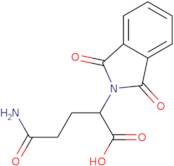N-α-Phthalyl-L-glutamine
CAS : 3343-29-1
Ref. 3D-DAA34329
| 5g | Arrêté | ||
| 10g | Arrêté | ||
| 25g | Arrêté | ||
| 50g | Arrêté | ||
| 100g | Arrêté |
Informations sur le produit
- (αS)-α-(3-Amino-3-oxopropyl)-1,3-dihydro-1,3-dioxo-2H-isoindole-2-acetic acid
- 2H-Isoindole-2-acetic acid α-(3-amino-3-oxopropyl)-1,3-dihydro-1,3-dioxo-, (αS)-
- 2H-Isoindole-2-acetic acid, alpha-(3-amino-3-oxopropyl)-1,3-dihydro-1,3-dioxo-, (alphaS)-
- 2H-Isoindole-2-acetic acid, α-(3-amino-3-oxopropyl)-1,3-dihydro-1,3-dioxo-, (S)-
- Glutaramic acid, 2-phthalimido-, <span class="text-smallcaps">L</span>-
- N-Phthaloyl-<span class="text-smallcaps">L</span>-glutamine
- N-Phthalylglutamine
- NSC 88735
- (2S)-5-Amino-2-(1,3-dioxo-1,3-dihydro-2H-isoindol-2-yl)-5-oxopentanoic acid
- Glutaramic acid, 2-phthalimido-, L-
- Voir d'autres synonymes
N-alpha-Phthalyl-L-glutamine is a synthetic amino acid that is not found in nature. It has been shown to be effective at inhibiting the growth of bacteria by dehydrating cells. N-alpha-Phthalyl-L-glutamine inhibits the synthesis of proteins, nucleic acids, and cell wall components in bacteria. It also inhibits the activity of amine oxidases, which are enzymes that break down neurotransmitters and other signaling molecules. N-alpha-Phthalyl-L-glutamine is a competitive inhibitor of glutamic acid decarboxylase, which converts glutamic acid into GABA. This inhibition leads to an accumulation of glutamic acid and increased production of GABA, which causes an increase in inhibitory activity on neurons.





